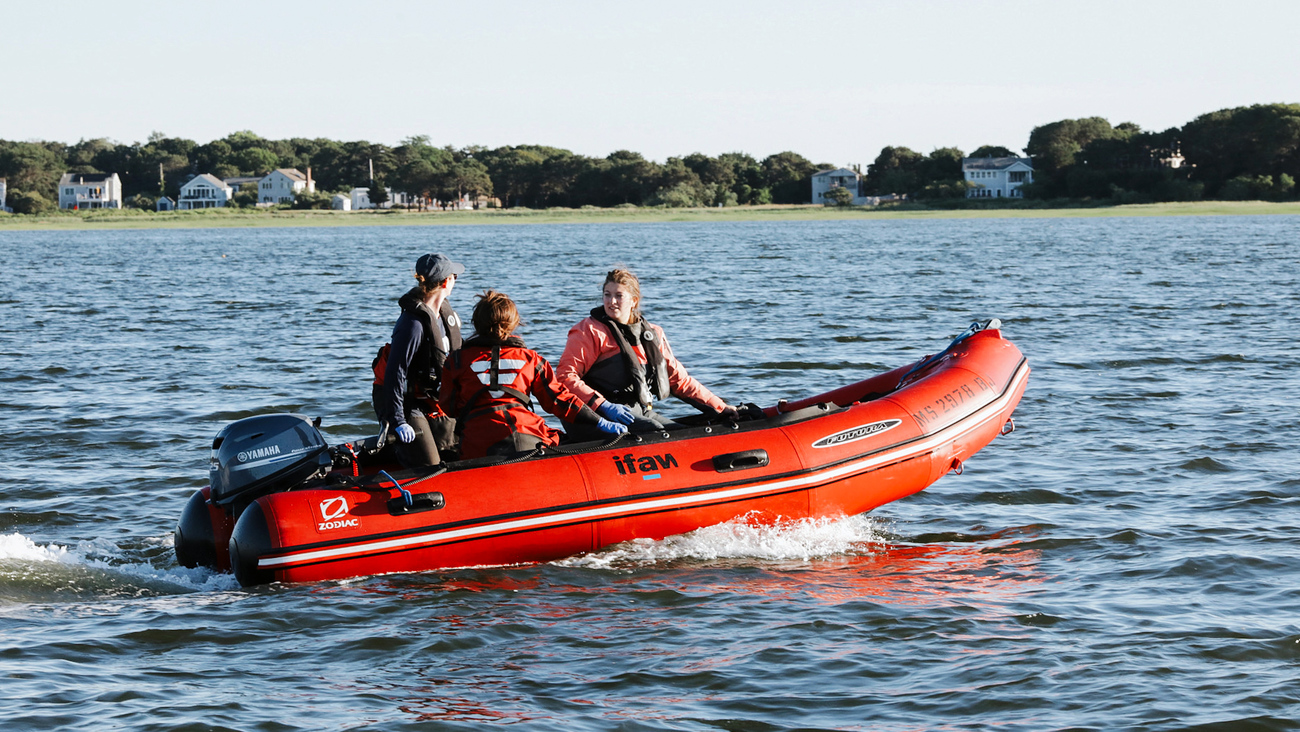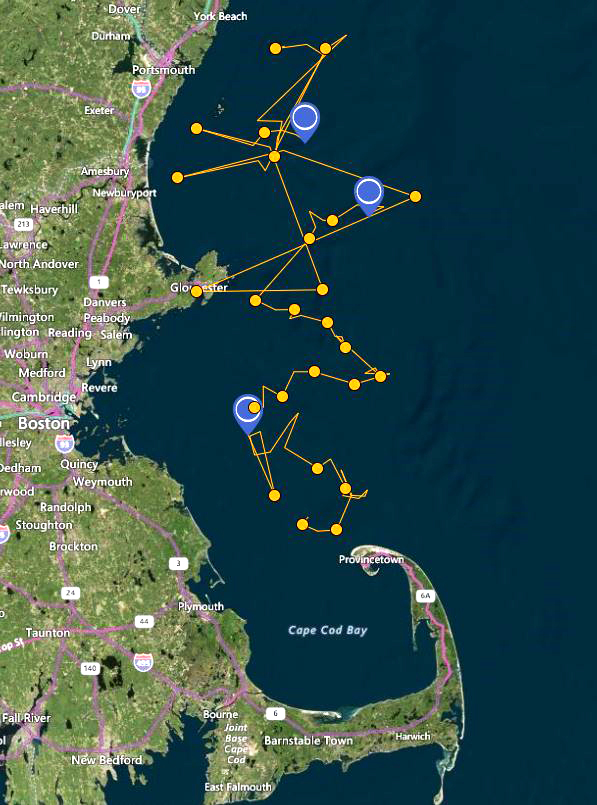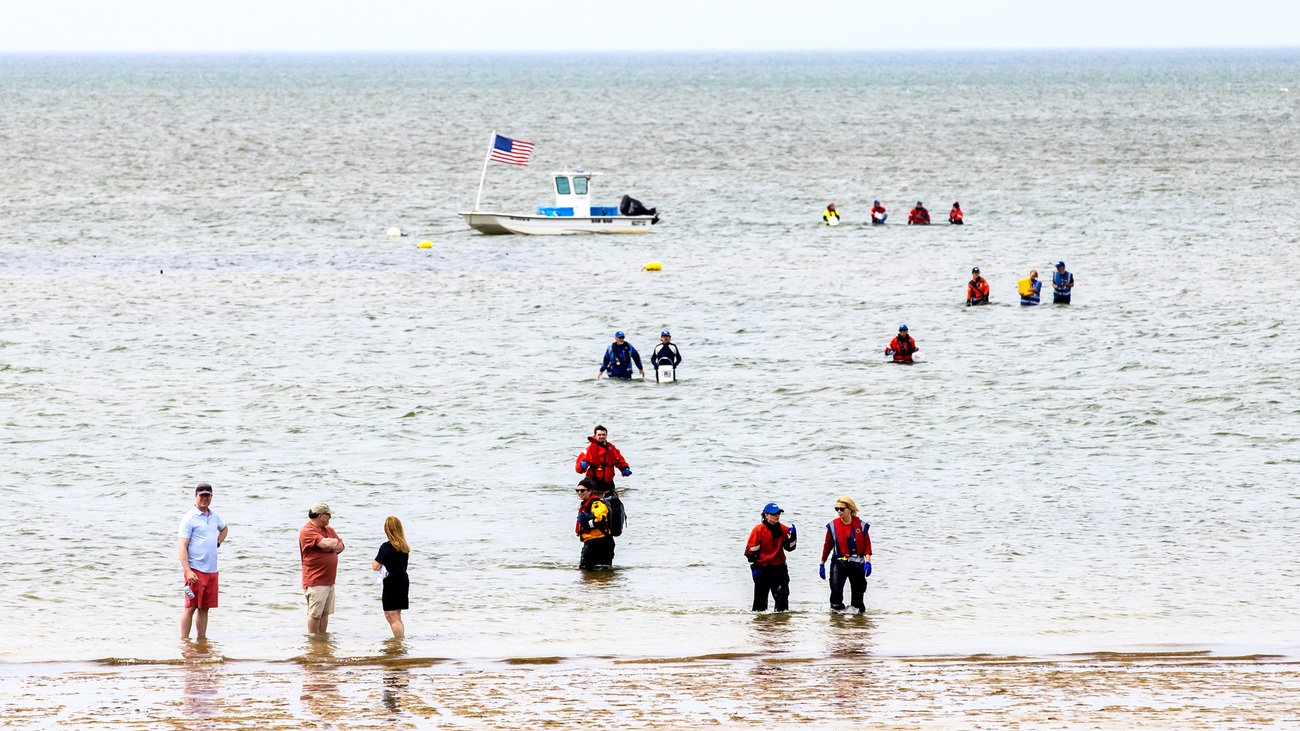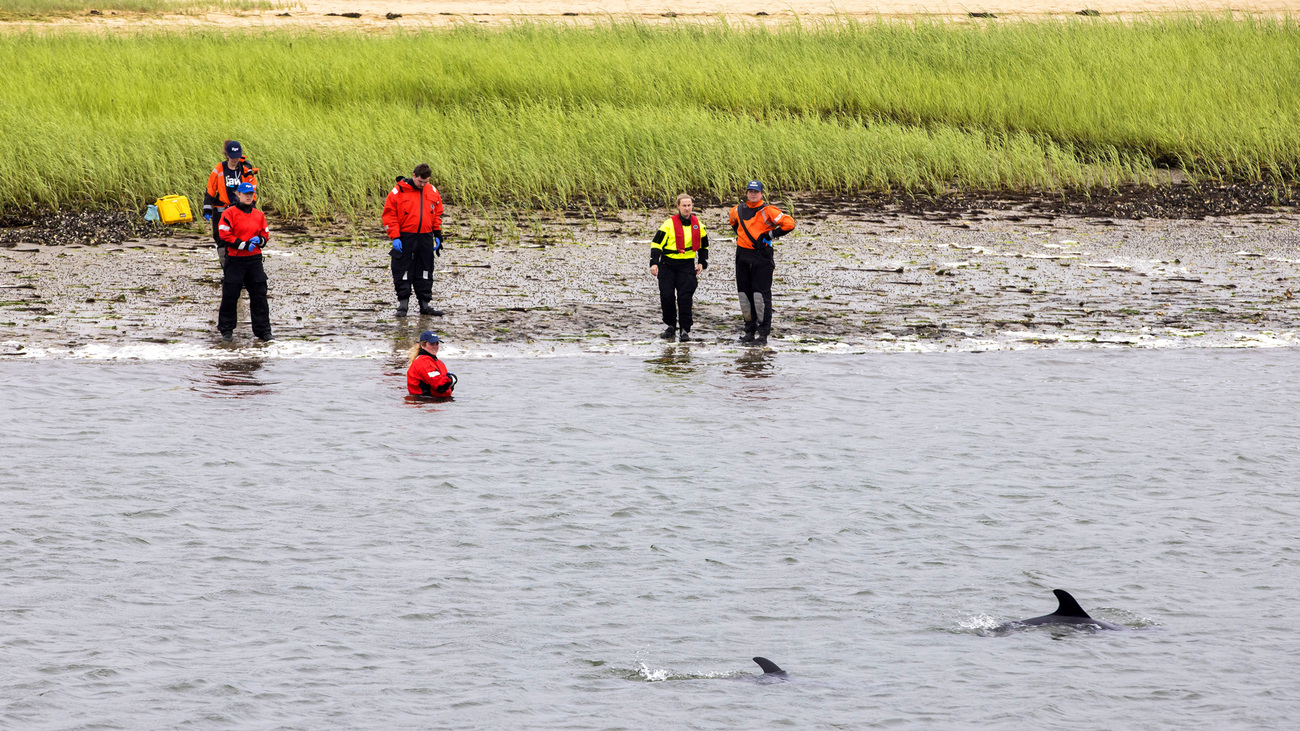Stranded Marine Mammal Rescue - Global
When the tide is low, the stakes are high for marine mammalsIFAW responds to the largest dolphin mass stranding in US history
IFAW responds to the largest dolphin mass stranding in US history
The mass stranding of dolphins that began on Cape Cod on 28 June and continued for several days has now been officially declared the largest mass dolphin stranding in US history. In total, 146 dolphins were involved, and we believe that 102 survived. Of the remaining, 37 dolphins died from natural causes and seven were humanely euthanised.
Satellite tags continue to show surviving animals swimming safely offshore. In addition, we have received reports from whale watch vessels that have encountered some of the dolphins—identified with temporary markings—now swimming among groups of hundreds of other dolphins that were not involved in the stranding.
Nine dolphins were extracted and transported in IFAW’s mobile dolphin rescue clinic to their eventual release sites.
During this large mass stranding, we exhausted our supplies, and our mobile rescue clinic suffered some damage and will need repairs. Help us restock our mobile dolphin clinic and help so many other animals in need.
The stranding response was a tremendous effort for our staff, volunteers, and partners over several days. With the approximately 70% survival rate, we consider this response extremely successful.
Cape Cod is a global hotspot for live dolphin strandings. Here, IFAW responds to an average of 315 cases per year. The preparedness and expertise that our marine mammal rescue team has gained in its 26 years in this area has enabled us to scale up and apply our knowledge to this largest-ever event.

July 8, 2024
The rescue of more than 100 dolphins off Cape Cod can be considered a huge success for IFAW’s marine mammal rescue team. The initial stranding event is now considered closed. More than 100 dolphins are now back where they belong in deeper waters, and tags are showing that they are swimming a safe distance away from the shore.
Since the stranding event began on 28 June, 20 dolphins died of natural causes and seven were humanely euthanised. Our team has performed necropsies and is gathering data to understand what may have caused this mass stranding.
Now that the event is over, our team is remaining ever vigilant and is focused on cleaning, restocking, and fixing gear and repairing rescue vessels and vehicles. This stranding event was the largest our team has ever experienced, and our response, with the help of local organisations and volunteers, has made it a success story.

July 2, 2024
On Monday, 1 July, IFAW’s marine mammal rescue team continued to monitor 11 dolphins remaining in Wellfleet harbour. One became stranded—the team assessed and released this animal from Provincetown with a satellite tag, but unfortunately this animal re-stranded the following day and had to be humanely euthanised.
On Tuesday morning, the remaining dolphins began to swim up Duck Creek, a historic mass stranding location and a difficult spot to extract dolphins from. Our teams headed to the scene, where they herded the dolphins toward shore to an accessible area. By forcing them to strand in a controlled way, the team was able to extract them and transport them via our mobile dolphin rescue clinic,
Of the 11 dolphins, 9 were deemed healthy enough to release, while two were humanely euthanised. The 9 were released at Herring Cove Beach in Provincetown, which gives the animals direct access to open ocean.
The team also monitored one untagged dolphin swimming in circles in Rock Harbor, Orleans, as it moved further and further into the harbour and eventually became stranded. Its swimming behaviour is unfortunately a bad sign indicating a grave prognosis. Experiencing multiple strandings and dealing with repeat tidal cycles puts these animals under extreme stress and trauma. Because of its physical state, this dolphin was humanely euthanised.
Additionally, the team humanely euthanised a dolphin that stranded at Boat Meadow in Eastham, where it showed signs of distress.
One dolphin that was rescued, released, and tagged on the morning of 28 June, just before the reports of mass strandings came in, is now tracking about seventeen miles east of Portsmouth, New Hampshire, and is doing well.
‘Stranding, herding, and being caught in recurring tidal shifts is incredibly stressful for the dolphins,’ Katie Moore said. ‘The prognosis for each animal declines as time passes if they continue to re-strand. The animals are likely showing signs of the cumulative stresses and trauma associated with repeat strandings and effects of tidal fluctuations, even if they have not re-stranded. While we are confident that the majority of the [approximately] 114 animals that were refloated on Friday have made it to deeper water, we have had reports of smaller groups close to shore each day. So, the team continues to manage each report as it is received.’
With the help of our partners and volunteers, we are proactively scouting the shoreline each day and working tirelessly to respond to reports as we receive them. As our team continues to take on these new rescues each day—using up their time and our resources, as well as dealing with equipment damage and injury—IFAW is grateful for the encouragement and attention of our supporters.

Response to mass dolphin stranding continues into Sunday
June 30, 2024
On Sunday, 30 June, the IFAW team was once again in Wellfleet. Most of the dolphins made it out to safety, but there are a couple of groups that remained close to shore.
On Sunday morning, the team was monitoring six dolphins in Wellfleet Harbour. One dolphin became stranded and was in poor condition, so it was humanely euthanised. ‘This is not only important for the welfare of that animal, but also helps us to be more successful in herding the remaining animals out,’ says Katie Moore, Deputy Vice President of Rescue at IFAW. ‘The very social nature of these dolphins means that they will stick together even in a bad situation. By removing individuals that are not well, the group may be more easily moved offshore.’
As they assessed options for helping these animals, they received a report of about 20 dolphins stranded in Brewster. Of those 20, two died before our team arrived on the scene. The remainder are now swimming safely offshore.

This is an evolving situation. Please keep checking that page for future updates.
Mass stranding of 125 dolphins continues Saturday
June 29, 2024
Following the 16-plus-hour response to 125 mass stranded dolphins on Friday, our team returned to the water in Wellfleet on Saturday morning, 29 June. They found 10 dolphins swimming in Duck Creek, one of the shallower inlets of Wellfleet’s inner harbour, and successfully herded them towards deeper water.
Volunteers scouted beaches along three towns, looking for stranded animals and confirming reports from beachgoers. Other volunteers assisted with data collection from the dolphins that did not survive.
IFAW staff remained in a boat throughout the day, encouraging these dolphins to swim away from the flats. In Eastham, our staff spotted an additional group of 25 dolphins, not stranded but swimming close to the shore.
We also received reports of large groups of dolphins, some of which had been tagged—meaning they were part of the stranded group on Friday—swimming successfully off Eastham and Brewster in Cape Cod Bay.
Rescuers respond mass dolphin stranding on Cape Cod
June 28, 2024
In the early morning of Friday, 28 June, IFAW’s marine mammal rescue team responded to a report of 10 Atlantic white-sided dolphins close to shore off Wellfleet, Massachusetts. But when they arrived on the scene, it was not just 10 dolphins, but 80 to 100. These numbers later escalated to 125—the largest single mass stranding IFAW has ever seen in our 26-year history on Cape Cod.
The dolphins were stuck in the shallow mud flats of Wellfleet’s Herring River ‘Gut’—a location known to be a hotspot for mass strandings due to its hook-like shape and extreme tidal fluctuations.
‘We were able to provide supportive care, help those that were struggling, and keep them comfortable and ready for the incoming tide,’ said Misty Niemeyer, IFAW stranding coordinator. First, the team worked on foot to herd the dolphins into deeper waters. As the tide came in, they switched to boats. Two IFAW vessels and the Wellfleet Harbormaster worked until sunset Friday night.
By then, most of the dolphins found their way to deeper waters, but a dozen or more remained swimming in the harbor. Before the team arrived, 10 dolphins had already died.
Niemeyer described how the rescue team faced challenges due to the number of dolphins, the large area, the muddy conditions, and the complicated locations from which the rescuers had to reach the animals. ‘It was a 12-hour, exhausting response in the unrelenting sun,’ Niemeyer said, ‘but the team was able to overcome the various challenges and give the dolphins their best chance at survival.’
Friday’s effort involved at least 25 IFAW staff, 70 trained volunteers, and assistance from AmeriCorps of Cape Cod, Whale and Dolphin Conservation, the New England Aquarium, the Center for Coastal Studies, and the Wellfleet Harbormaster.
Related content
Every problem has a solution, every solution needs support.
The problems we face are urgent, complicated, and resistant to change. Real solutions demand creativity, hard work, and involvement from people like you.